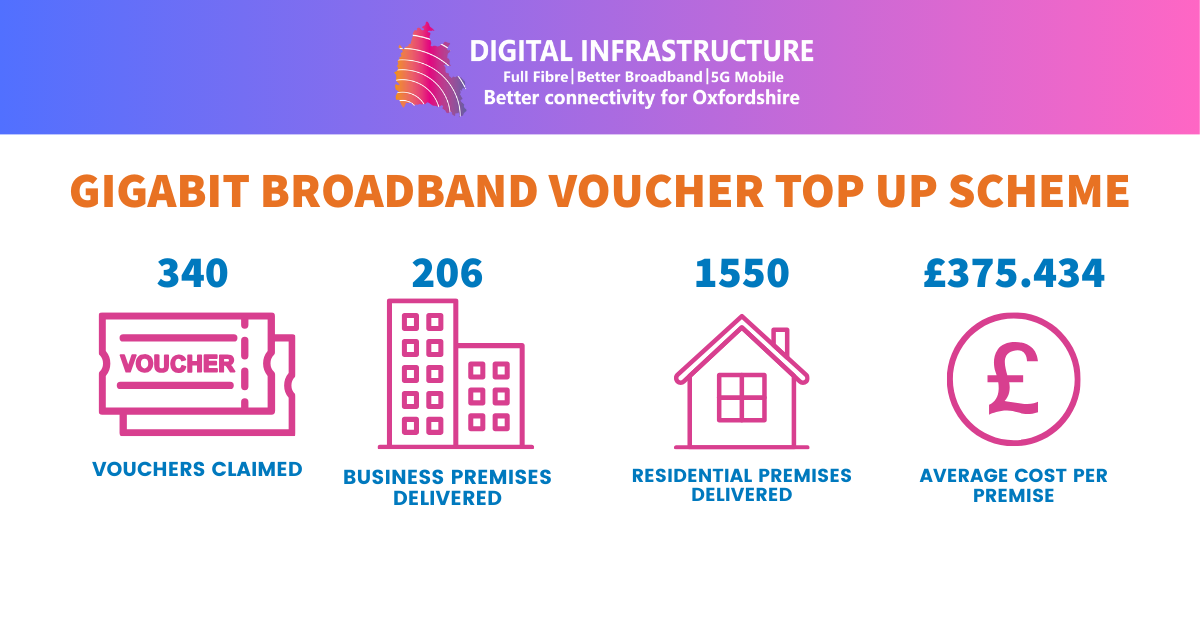Gigabit Broadband Voucher Top-Up Scheme
The Gigabit Broadband Voucher Scheme (GBVS) was part of Project Gigabit, and focused on helping specific people and communities in rural areas upgrade their broadband connection.
Top-up Scheme
The Top-up scheme served as an additional programme that enhanced the value of vouchers provided under the Gigabit Broadband Voucher Scheme (GBVS). Its purpose was to improve the commercial viability of delivering broadband services to more remote areas. Without this supplementary scheme, these regions were often too costly to service commercially, which resulted in projects either not moving forward or requiring personal investment from residents to bridge the funding gap.
Oxfordshire project overview
The £1M grant ‘top up vouchers’ provided to Enterprise Oxfordshire (formerly OxLEP) by the Ministry of Housing, Communities, and Local Government through the Getting Building Fund increased funding for digital connectivity and boosted the regional economy alongside the existing Gigabit Broadband Voucher Scheme (GBVS).
This initiative enhanced digital connectivity across Oxfordshire, particularly in rural areas, by providing financial support to eligible businesses and residents for the installation of gigabit-capable broadband.
Funding and administration
The project was funded through a £1M grant from the Ministry of Housing and Local Communities (MHCLG), administered by Enterprise Oxfordshire. The DIP team managed to pay out £659,259 to suppliers for the successful delivery of the top-up voucher schemes. The top-up scheme increased the value of the vouchers provided under the Gigabit Broadband Voucher Scheme, making it more commercially viable for suppliers to deliver broadband in harder-to-reach areas.
The Digital Infrastructure Programme’s role in this project
- Collaborated with Enterprise Oxfordshire to submit a successful funding bid to MHCLG.
- Worked with BDUK to agree on the terms of the top-up and establish the scheme.
- Identified eligible premises within Oxfordshire based on the top-up funding criteria.
- Communicated the top-up scheme to eligible areas across Oxfordshire through emails to parishes, districts, and councillors, as well as website updates and providing our mailbox for enquiries.
- Updated our website map to display voucher-eligible premises.
- Informed all registered suppliers about the top-up scheme (suppliers needed to be registered as voucher suppliers with BDUK to use vouchers).
- Advised suppliers on eligible premises within Oxfordshire.
- Responded directly to public and community enquiries, guiding them through the steps to apply for the voucher scheme.
- Worked with scheme leads (community members nominated as single points of contact/broadband champions) to identify all eligible premises in their community and progress their scheme applications.
- Liaised with BDUK, suppliers, and the local community throughout the entire process (typically 12-18 months per scheme) to ensure all requirements were met and schemes progressed smoothly. Acted as intermediaries, as BDUK only liaised with suppliers and reported to us, while the community dealt directly with suppliers but sought our advice and oversight.
- Provided advice and guidance at each stage of the process, including unpicking reasons for voucher disapprovals and appealing unjust decisions with BDUK, to both scheme leads and suppliers.
- Reviewed and approved vouchers allocated to schemes by BDUK in monthly top-up reports and confirmed figures to BDUK.
- Worked with suppliers and their build teams throughout the build stages to stay updated on fibre build progress and resolve issues (e.g., permits and road closures).
- Confirmed premises were live when the build was declared complete by the supplier build team.
- Reviewed and approved vouchers paid out by BDUK in monthly top-up reports and confirmed completed figures to BDUK.
- Processed payments to BDUK for top-up vouchers paid out quarterly.
- Reported quarterly to Enterprise Oxfordshire on the number of premises connected and the amount of grant funding spent.
Challenges
One of the challenges faced during the project was the slow administration of the voucher scheme process by BDUK, which led to issues with data management and processing of applications. Despite these challenges, the DIP team successfully promoted the top-up vouchers to communities, assisted them in engaging with suppliers, and tracked the delivery of approved schemes.
Achievements
The project achieved significant milestones:
- 340 vouchers claimed: Beneficiaries utilised the vouchers to upgrade their broadband infrastructure.
- 206 business premises delivered: High-speed broadband was installed at numerous business locations, boosting their digital capabilities.
- 1550 residential premises delivered: Many households benefited from improved internet connectivity, enhancing their access to digital services.
- Average cost per premise: The average cost for delivering broadband to each premise was £375.434.

Future Plans
The Gigabit Broadband Voucher Scheme has significantly improved digital connectivity in Oxfordshire, particularly in rural areas. The project has closed as of April 2022, and the team is awaiting further updates from BDUK for future initiatives.
For more information, please visit Enterprise Oxfordshire’s website.
